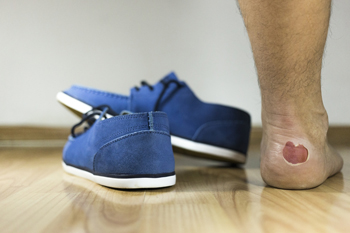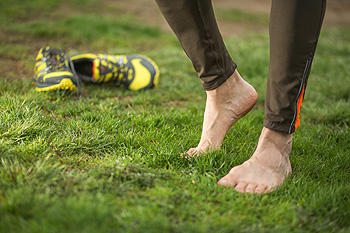Items filtered by date: May 2019
Edema and Pregnancy
Many pregnant women notice their feet have become swollen. This is caused by the pressure that is put on the lower limbs, which is often the result of a growing fetus. The medical term for excessive swelling is referred to as edema, and is a common ailment in a large percentage of pregnant women. It is beneficial to wear shoes that are comfortable, and elevating the legs frequently during the day may bring mild relief. Additionally, the feet may swell as a result of high blood pressure. Research has shown if one foot becomes swollen, it may be indicative of an existing medical condition. If you would like additional information about how pregnancy affects the feet, it is suggested that you schedule a consultation with a podiatrist.
Pregnant women with swollen feet can be treated with a variety of different methods that are readily available. For more information about other cures for swollen feet during pregnancy, consult with Dr. Tupper from Coshocton Foot Health Center. Our doctor will attend to all of your foot and ankle needs.
What Foot Problems Can Arise During Pregnancy?
One problem that can occur is overpronation, which occurs when the arch of the foot flattens and tends to roll inward. This can cause pain and discomfort in your heels while you’re walking or even just standing up, trying to support your baby.
Another problem is edema, or swelling in the extremities. This often affects the feet during pregnancy but tends to occur in the later stages.
How Can I Keep My Feet Healthy During Pregnancy?
- Wearing orthotics can provide extra support for the feet and help distribute weight evenly
- Minimize the amount of time spent walking barefoot
- Wear shoes with good arch support
- Wear shoes that allow for good circulation to the feet
- Elevate feet if you experience swelling
- Massage your feet
- Get regular, light exercise, such as walking, to promote blood circulation to the feet
If you have any questions please feel free to contact our office located in Coshocton, OH . We offer the newest diagnostic and treatment technologies for all your foot and ankle needs.
Types of Running Injuries
Research has indicated that many runners get injured every year. Running injuries can be prevented when properly fitted shoes are worn, and stretching techniques are implemented. A common injury is referred to as Achilles tendinitis, which is typically caused by tight calf muscles. The Achilles tendon can be strengthened by performing heel raises several times before running. If you have plantar fasciitis, you are most likely familiar with the pain that exists in the heel of the foot. Mild relief may be found when the plantar fascia is properly stretched. This is accomplished by pulling your toes gently away from your foot, in addition to rolling the bottom of your foot on a frozen water bottle or tennis ball. If you would like more information about how to prevent running injuries, it is suggested that you counsel with a podiatrist.
Exercising your feet regularly with the proper foot wear is a great way to prevent injuries. If you have any concerns about your feet, contact Dr. Tupper of Coshocton Foot Health Center. Our doctor will treat your foot and ankle needs.
How to Prevent Running Injuries
Many common running injuries are caused by overuse and overtraining. When the back of the kneecap starts wearing out and starts causing pain in your knee, this is commonly referred to as runner’s knee. Runner’s knee is a decrease in strength in your quadriceps and can occur if you’re not wearing properly fitted or supporting shoes. To prevent runner’s knee, focusing on hip strengthening is a good idea, as well as strengthening your quads to keep the kneecaps aligned.
What Are Some Causes of Running Injuries?
- One cause of a common running injury is called iliotibial band syndrome.
- Plantar fasciitis is also another common injury.
- Stress fractures can occur from overtraining, lack of calcium, or even your running style.
Best Ways to Prevent Running Injuries
- Wear footwear that fits properly and suits your running needs.
- Running shoes are the only protective gear that runners have to safeguard them from injury.
- Make a training schedule. Adding strengthening exercises as well as regular stretching can help keep you strong and limber and can lessen the possibility of injuries.
- Stretching keeps muscles limber; this will help you gain better flexibility.
If you have any questions please feel free to contact our office located in Coshocton, OH . We offer the newest diagnostic and treatment technologies for all your foot and ankle needs.
What Is a Blister?
 Many runners are familiar with the pain and discomfort that blisters on the feet can bring. They are typically caused by friction as a result of wearing poorly fitting shoes, or non-absorbent socks. When the skin becomes raw and damaged, a blister will form to protect the skin. It is filled with fluid that will naturally drain when new skin has formed over the affected area. If the blister should rupture before the healing process is completed, the possibility of getting an infection may increase. There are methods that can be implemented to possibly prevent blisters. These include choosing shoes that fit correctly and covering the area with a bandage where blisters are most likely to develop. Additionally, it is beneficial to use a foot powder that helps to absorb moisture. If you have a blister on your foot that is not healing correctly, please consult with a podiatrist who can properly treat this condition.
Many runners are familiar with the pain and discomfort that blisters on the feet can bring. They are typically caused by friction as a result of wearing poorly fitting shoes, or non-absorbent socks. When the skin becomes raw and damaged, a blister will form to protect the skin. It is filled with fluid that will naturally drain when new skin has formed over the affected area. If the blister should rupture before the healing process is completed, the possibility of getting an infection may increase. There are methods that can be implemented to possibly prevent blisters. These include choosing shoes that fit correctly and covering the area with a bandage where blisters are most likely to develop. Additionally, it is beneficial to use a foot powder that helps to absorb moisture. If you have a blister on your foot that is not healing correctly, please consult with a podiatrist who can properly treat this condition.
Blisters may appear as a single bubble or in a cluster. They can cause a lot of pain and may be filled with pus, blood, or watery serum. If your feet are hurting, contact Dr. Tupper of Coshocton Foot Health Center. Our doctor can provide the care you need to keep you pain-free and on your feet.
Foot Blisters
Foot blisters are often the result of friction. This happens due to the constant rubbing from shoes, which can lead to pain.
What Are Foot Blisters?
A foot blister is a small fluid-filled pocket that forms on the upper-most layer of the skin. Blisters are filled with clear fluid and can lead to blood drainage or pus if the area becomes infected.
Symptoms
(Blister symptoms may vary depending on what is causing them)
- Bubble of skin filled with fluid
- Redness
- Moderate to severe pain
- Itching
Prevention & Treatment
In order to prevent blisters, you should be sure to wear comfortable shoes with socks that cushion your feet and absorb sweat. Breaking a blister open may increase your chances of developing an infection. However, if your blister breaks, you should wash the area with soap and water immediately and then apply a bandage to the affected area. If your blisters cause severe pain it is important that you call your podiatrist right away.
If you have any questions, please feel free to contact our office located in Coshocton, OH . We offer the newest diagnostic and treatment technologies for all your foot care needs.
The Importance of Caring for Diabetic Feet
Elevated blood sugar levels are the main cause of diabetes. People who have this condition have to pay extra attention in caring for their feet. Diabetic patients may experience a tingling feeling or numbing sensation, and this can make it difficult in noticing any cuts that may be present on the feet. This type of nerve damage can lead to an infection and can cause gangrene if it is not treated promptly. Typical symptoms of a foot infection can include fever, unmanageable blood sugar levels, and skin discoloration. If you are a diabetic patient and would like information about taking care of your feet, it is advised to seek the counsel of a podiatrist who can properly guide you.
Diabetic foot care is important in preventing foot ailments such as ulcers. If you are suffering from diabetes or have any other concerns about your feet, contact Dr. Tupper from Coshocton Foot Health Center. Our doctor can provide the care you need to keep you pain-free and on your feet.
Diabetic Foot Care
Diabetes affects millions of people every year. The condition can damage blood vessels in many parts of the body, especially the feet. Because of this, taking care of your feet is essential if you have diabetes, and having a podiatrist help monitor your foot health is highly recommended.
The Importance of Caring for Your Feet
- Routinely inspect your feet for bruises or sores.
- Wear socks that fit your feet comfortably.
- Wear comfortable shoes that provide adequate support.
Patients with diabetes should have their doctor monitor their blood levels, as blood sugar levels play such a huge role in diabetic care. Monitoring these levels on a regular basis is highly advised.
It is always best to inform your healthcare professional of any concerns you may have regarding your feet, especially for diabetic patients. Early treatment and routine foot examinations are keys to maintaining proper health, especially because severe complications can arise if proper treatment is not applied.
If you have any questions please feel free to contact our office located in Coshocton, OH . We offer the newest diagnostic and treatment technologies for all your foot and ankle needs.





